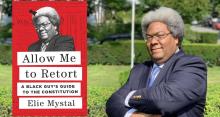
Constitution from Wallpaper Cave (edited); Signers of Declaration of Independence from Wikimedia Commons / Public domain

Constitution from Wallpaper Cave (edited); Signers of Declaration of Independence from Wikimedia Commons / Public domain
This collection of essays and resources explores the role of the United States Constitution in perpetuating racism. While many individuals and groups document inadequacies in the Constitution, this section addresses questions like: How does the structure of the government preserve racism? What kind of government structure will support a multicultural nation without racism? How do we use Article V of the Constitution to transform America?

U.S. election laws date back to Article 1 of the Constitution which outlines the structure of America's federal government. It also guarantees the states and people certain rights. Many constitutional amendments and federal laws have passed to help protect the right to vote and to make it easier for citizens to exercise that right.
"No right is more precious in a free country than that of having a voice in the election of those who make the laws under which, as good citizens, we must live. Other rights, even the most basic, are illusory if the right to vote is undermined." ~Justice Hugo Black, Wesberry v. Sanders, 376 U.S. 1,17 (1964)

We who believe that racism needs to end are working hard to overcome our own biases and working with others to identify both conscious and unconscious biases. Many are also addressing institutional racism in the communities and organizations we relate to. But a very well-funded project is working at odds with our projects and seeking to stop progress on tearing down barriers that non-white people experience, end privileges experienced by whites, and empower all identity groups to have full participation in the cultural, economic, and political life of America.

Elie Mystal has a wonderful way of making things that lawyers talk about regarding the Constitution sound like common sense. As the legal analyst and justice correspondent for “The Nation,” an MSNBC legal commentator, and the legal editor of the “More Perfect” podcast on the Supreme Court for Radiolab, he argues for the American people to take the country away from the conservatives.

The January 6th hearings in the House of Representatives exposed attempts by Donald Trump to subvert the Constitutional system used to elect presidents. Neither President Trump and his co-conspirators nor the people who ensured the non-violent transfer of power to President Biden were driven by a commitment to democracy. Trump was unsuccessful because people were loyal to the Constitution.
A commitment to the Constitution as it stands with an equal commitment to changing the Constitution when it is not fulfilling the values of democracy is the path to creating a multi-cultural nation that is not based on racism.

The May 2022 random murders of people in Buffalo, New York; Laguna Woods, California; and Uvalde, Texas were stark reminders of the fragility of human life and how precious every child and adult is. My granddaughter went to bed crying. Barack and Michell Obama are angry. I keep asking myself, what can I do? I am still troubled by the question, but I have one idea.

Edward McNulty is a film critic, an activist, and a Presbyterian pastor. He recommends films each month to the Ending Racism USA community.

The men who wrote the Constitution knew that it is not perfect. So, they provided a way that changes can be made. The process to amend is outlined in Article V. Amending is a political process that is much more difficult than making laws. However, it has provided a path in the past to reorganize structures of the government. Today we have a government based on the idea that white men are superior to others. And we have a tool to fix that. It is Article V of the Constitution.